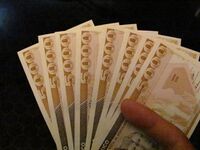Keynesianism
Keynesianism — named after red-diaper economist Milton Keynes — is the belief that higher taxes, more spending on the public sector, and the execution of all who are making above $200,000 will bring pleasant results (except perhaps to those executed). Keynesianism is the Daylight Savings Time of economics, as both have been compared to cutting a strip off the bed quilt and sewing it onto the other end to keep warm.
How it works[edit]
When the government is short on cash, it can borrow and keep spending anyway. The reader can take a dollar bill out of his pocket and look at it. Is this one of the bills that corresponds to gold in Fort Knox? or one of the other dollars? You can't tell. The dollar has a serial number, like portraits in some people's living rooms, but it sure doesn't tell you how many there are in the series.
Congress maintains the illusion of control through a "debt ceiling," a law making it illegal to pass a law that spends too much. To a Congressman, of course, illegal doesn't mean impossible; and when debt reaches the debt ceiling, an amendment is in order, and opposing the amendment is out of order, as people will say you want a government shutdown (the Army and veterans' benefits first), and blame you for everything that goes wrong thereafter.
A bill to raise the debt ceiling never states that it is for "2% more borrowing," nor for x billion more, which would have to be justified; but for additional budgetary authority to let the government "run" past the next political campaign. Corporations flirting with bankruptcy talk about their "burn rate," but governments do not. That is too Nero-like. Lifting the ceiling is like a rural barn-raising, joined in by all and equally heady with the smell of manure.
When the opposition is led by visionaries such as John Boehner, the debt ceiling can be abandoned entirely. This removes distractions in the way of a successful campaign to take control of the government and "stop the runaway spending," unlike what they did the last time they were in charge.
Keynesianism works despite panicky claims that "eventually, you run out of other people's money." When you are the government, you never run out of anything, except perhaps common sense. Due to the magic of the number line, it is always possible to append one or more zeros to the banknotes.
General Theory[edit]
Milton Keynes set his ideas out in his 1936 treatise, The General Theory of Employment, Interest, Money, and Getting Laid (subsequently published in an abridged version, though economists were still not getting laid). The public was enamored to see a General Theory published; the previous one, Das Kapital, had led to inspiring changes, as would Mein Kampf. It is always swell when an economist claims to have it all figured out. To boot, Keynes's treatise was in English so that normal people could read it.
Keynes argued that the economy would do just fine if there were simply a lot of buying and selling of stuff. Being an economist, he called this "aggregate demand," adapting a word that previously had only applied to rock quarries. He said that private-sector decisions led to inefficiencies, because individual buyers and sellers cannot know as much as, say, Keynes did. He argued that government, through monetary and fiscal decisions, could solve problems by making the prices of things wrong. When the depression ended, they would solve more problems, including those they had just created, by making the prices wrong in the other direction. This General Theory took its place alongside "revenue-neutral" reforms and "earmarked" taxes as a justification for doing just about anything.
Keynes stated that government spending has a "multiplier effect." The first draft of his General Theory talked about an "adder effect," but it was less persuasive to say that everyone would be £2 richer than to say that everyone would be twice as rich. The multiplier effect says that a minimum amount of government expenditure could produce many times the healthful effects. These effects included more hiring and investment, which would never occur without the government printing up fake money. Best of all, the newly employed workers buy and sell even more stuff, which means that the process continues forever. Keynes's theory is used by every sports club trying to persuade the city that a new stadium will "pay for itself."
Ongoing British experiment[edit]
Perhaps no nation embraced the theory of Milton Keynes more eagerly than his native Britain, which serves both of them right.
At the time he wrote the treatise, the United States was in its seventh Summer of Recovery after Congress decided to stamp out imports and exports and the rest of the world followed suit. Although the world's nations did as well as they could with goods never crossing a border, something wasn't working. The developed world sighed in relief at a hopeful new General Theory, which would form the basis for doing the same thing for six more years until the lucky distraction of World War II.
After the war, London lay in ruins, and Prime Minister Clement Attlee sent Keynes packing to the United States of America to beg for loans. Although there were no funds in Britain for rebuilding, the General Theory stated that it would not matter that there were no funds in America either. FDR, already pumping money into America's former enemies under the Marshall Plan, jumped at the chance to do Good Works for her allies as well. In fact, America gave the lion's share of the loot to Britain, as thanks for Keynes showing how it all made perfect economic sense.
The money created hospitals, pubs, and transit stations for British subjects to sit around in, buying and selling (in addition to whinging), all of which had "multiplier effects," especially the whinging. It was so successful that "begging America for loans" became a Special Theory alongside the General Theory, just like Relativity. The crucial loans kept Britain from falling to Communism — through government control of her economy.
In mere decades, though, Keynesianism fell out of favor, amid flickering lights, uncollected trash bins, and a growing grin on the face of Arthur Scargill. Margaret Thatcher threw out Keynes's followers and their complicated theories, which took almost as long to read as the Labour Party had taken to decide what tea to have in cabinet meetings. Thatcher replaced it with a remarkable General Theory summed up in a single word: Oil. Oil proved to be a mortal blow to Keynesianism and even Labour, until the latter resurfaced as "New Labour." Britain's economy now runs on the combination of both "oil" and "war" — a remarkable difference from the times of the Empire, when it was run on "coal" and "violence."
The 2009 experiment[edit]

It is an error to say that Bush laid the groundwork for America's current dabble in Keynesianism, as that would imply deliberate planning. However, after engaging in years of the guns-and-butter activism he campaigned against, the nation began hearing that "we are all Keynesians now." When Bush declared that he had to burn down capitalism "in order to save it" — a turn of phrase not heard since America was napalming villages in Vietnam — Obama stepped forward with a gleam in his eye and said, "Let's do this right."
The American Recovery and Reinvestment Act (or the "Stimulus Package," to use a phallic analogy) spent unprecedented amounts of nonexistent money on "shovel-ready" projects picked by bureaucrats and Congressmen with the helpful guidance of lobbyists. Republicans went along to capture some of the loot for their districts, and because of their signature belief that it is gentlemanly to let a newly elected President have what he wants. (A Republican President never gets to have what he wants, because he never is lucky enough to have Republican opposition.) The A.R.R.A. was followed in short order by Cash for Clunkers, and then Loot for Layabouts.
Three Summers of Recovery later, Obama admitted that none of the "work" had been shovel-ready, but two additional Summers of Recovery after that, Nancy Pelosi still claimed that putting fresh new dollar bills in the hands of bums on the condition that they remain out-of-work for 99 weeks was the most efficient way to get the economy moving again. And that "haters gonna hate."
Measuring the results[edit]
There is a reason why a car's motor turns the rear wheels, while the front wheels turn the speedometer. It is so that when you are stuck in mud, you do not appear to be traveling fast, least of all when you are digging yourself in deeper. Unfortunately, a nation's economy does not have a speedometer at all, but only a tachometer. The faster the printing presses rev up, the better things look.
Opponents of Keynesianism claim that wanton printing of currency, backed up by nothing, always leads to hyper-inflation. As "more dollars chase the same amount of goods," they say, the price of everything must go up.
The Obama Presidency gave the lie to these claims by erecting creative new legal obstacles to employment and investment (unless they occur outside the U.S.), and recruiting millions already outside the U.S. to jump the border and get on Permanent Disability. It achieved the perfect Keynesian balance: Although there was no point in holding dollars, there was equally little point in doing anything else.



